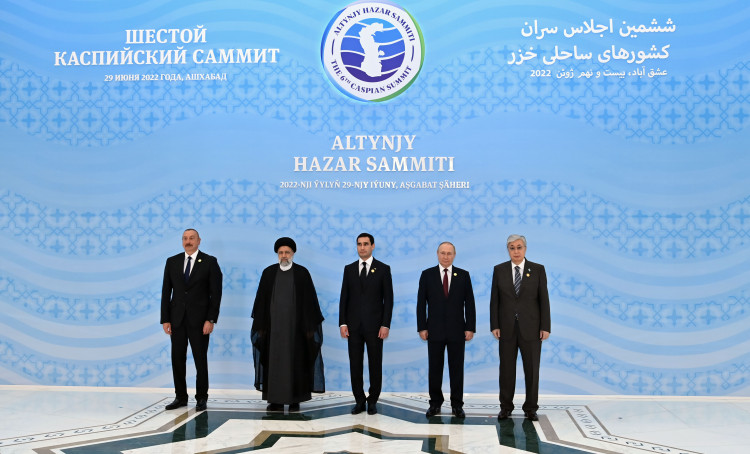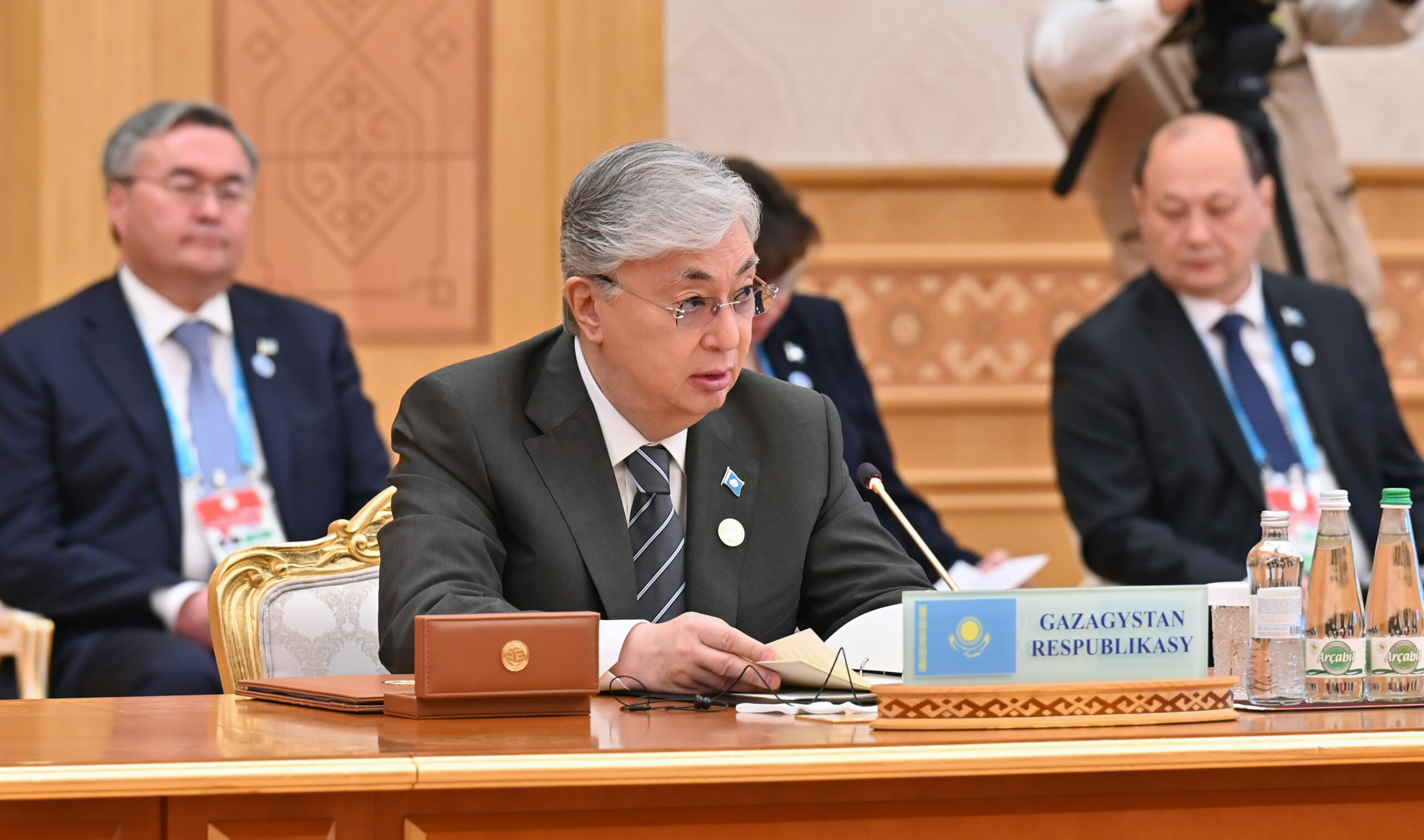NUR-SULTAN – President Kassym-Jomart Tokayev emphasized the growing importance of the Caspian Sea due to its geostrategic location, rich natural resources, and transit potential which become more relevant taking into account the geopolitical developments in the region during the sixth Caspian Summit on June 29 in Ashgabat, reports the presidential press service.

From L to R: Ilham Aliyev, Ebrahim Raisi, Serdar Berdymukhamedov, Vladimir Putin and Kassym-Jomart Tokayev. Photo credit: Akorda
“Four years have passed since the historic summit in Aktau. During this time, the world has changed dramatically. The coronavirus pandemic, the growing geopolitical tension and other challenges require us, as never before, to combine our efforts to ensure the stability and sustainable development of the Caspian region,” said Tokayev addressing the leaders of Azerbaijan, Iran, Russia and Turkmenistan.
Over the past 30 years, the status of the Caspian Sea has been a matter of heated geopolitical discussion. Much of the dispute hinged on whether the world’s largest inland water body should be considered a lake or a sea.

President Tokayev addressing the meeting. Photo credit: Akorda
The Caspian didn’t make waves before the dissolution of the Soviet Union in 1991 when it was shared only between the Soviet Union and Iran, which classified it as a lake in the 1921 and 1940 treaties. The years after 1991 witnessed a long debate between Russia, Iran, and the three independent states that emerged from the collapse of the Soviet Union and now bordered the body of water: Kazakhstan, Turkmenistan, and Azerbaijan.
After more than two decades of diplomatic negotiations, the five states gathered in Aktau in western Kazakhstan in August 2018, to sign the Caspian Convention, which decided that the Caspian has a “special legal status.”
The convention grants the states jurisdiction over 15 miles of territorial waters extending from their coastlines and exclusive fishing rights over an additional 10 miles. The rest of the water is subject to bilateral agreements between the littoral countries.
According to Tokayev, the Caspian Sea is not only a huge reservoir of useful resources, but also a “sea of unlimited opportunities.” He outlined promising areas for cooperation to fully unlock the potential of the Caspian countries.
“Today, our primary objective is to ensure a fast entry into force of the Convention. For four years we have been working diligently to find mutually acceptable solutions for this issue. We in Kazakhstan are sympathetic to the position of the parties, as these issues directly affect national interests. For our part, we are ready to make every effort to achieve the desired result,” said the President.
He noted that with the disruption of traditional logistics chains, transport interconnectivity is becoming a key factor for sustainable growth and strengthening economic ties between states, stressing the increasingly important role of the Trans-Caspian international transport route in ensuring transit flows between Europe, Central Asia and China.
“Following the results of five months this year, the volume of transportation of Kazakhstan’s cargoes along the route increased 2.5 times, and the total cargo turnover with the Caspian countries increased by more than nine percent. To increase the volume of cargo flows by sea, we have started modernizing its port infrastructure and expanding the maritime fleet. I believe that we should jointly and promptly solve urgent organizational issues. This concerns timely approval of mutually acceptable and unified tariffs and eliminating bottlenecks,” said Tokayev.
Speaking about food security, Tokayev stated that the volume of mutual trade of Kazakhstan with the Caspian countries was approximately $3.5 billion, and around 70 percent of it was with Russia via land routes.
“Kazakhstan has significant potential to increase exports of meat and dairy products. To strengthen trade cooperation between our states, we have to consistently develop modern logistics infrastructure. Therefore, we propose to create a Caspian food hub, which will allow increasing mutual trade turnover with minimal costs,” he said.
Kazakhstan has begun the construction of modern wholesale and distribution centers with a technologically advanced system of warehousing, storage, and sale of food products. Tokayev suggested integrating these centers with the Caspian food hub to “open up new opportunities for effective cooperation of farmers, buyers, carriers, sellers and consumers.”
But hardly anything will be possible if the Caspian ecosystem is not taken care of – crucial for millions of people living near the Caspian shores. Tokayev mentioned the grim example of the Ural river, Europe’s third longest river, which is seeing a sharp decline in water flow, reduction of bioresources, degradation of floodplain vegetation, and anthropogenic pollution.
“Active exploitation of subsoil resources and transportation of resources carry great risks for the ecology of the region. The challenges of global warming and related climate change pose a threat to water resources,” he added.
Speaking about the environmental problems of the common sea, he pointed out the recurrent deaths of the Caspian seals. The Caspian seal is a unique marine mammal and it is found nowhere else in the world but in the Caspian Sea. Its population has rapidly declined by almost 90 percent and the population is now down to around 100,000 due to both human-induced and natural factors driving their extinction, including unsustainable commercial hunting and toxic emissions in the sea.
“It migrates throughout the reservoir and is considered a transboundary bioresource. Last year Kazakhstan and Russia signed a five-year joint action plan for the conservation of the Caspian seal population. Since 1974 there have been protected areas of Kazakhstan and Russia in the northern part of the Caspian Sea. However, the measures taken are still not enough to preserve the red-listed animal. That is why we are now considering reformatting the reserve zone into a specially protected natural area,” said Tokayev.
Combating illegal fishing in the Caspian Sea is also important for the preservation of the ecosystem.
“It is important to remember that during the development of the Caspian Sea and coastal areas there are high risks of man-made accidents and natural disasters. Therefore, it is necessary to systematically develop a regional mechanism for prevention and elimination of consequences and mutual assistance in case of emergencies,” he added.
At the end of their meeting, the leaders signed a joint communique.
